#I did a base sketch in fresco to put the colors down and then moved to MediBang to refine it and then jumped back into fresco
Explore tagged Tumblr posts
Text
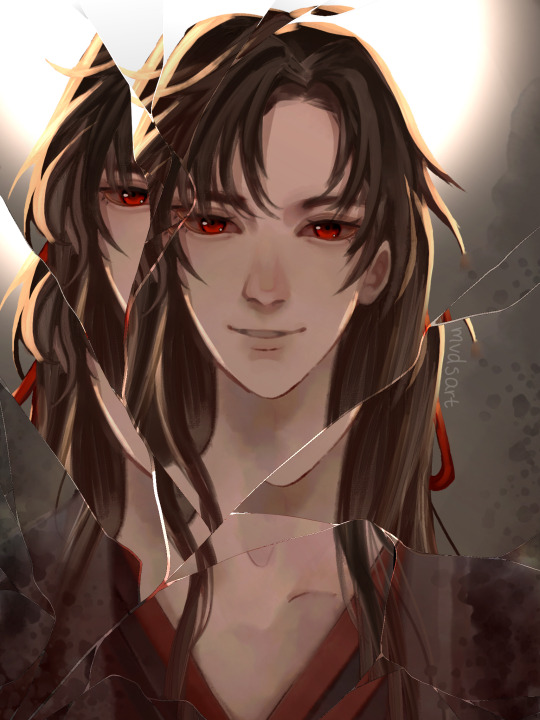
Nothing living leaves the Burial Mounds.

#mdzs#mo dao zu shi#grandmaster of demonic cultivation#mdzs fanart#wwx#wei wuxian#fanart#my art#yiling patriarch#yiling laozu#guess who just got adobe fresco :D#this is a mix of adobe fresco and MediBang actually#I did a base sketch in fresco to put the colors down and then moved to MediBang to refine it and then jumped back into fresco#to add some texture and then finished it off with the mirror effect in medibang#originally the idea was to have mxy!wwx looking at himself through a cracked mirror#except some of the mirror shards would reflect Yiling Patriach!wwx instead#and I was like ‘man that’d be such a sick idea’#but then I realized that’d mean I’d have to draw two wwx images#don’t have the energy for that :(
1K notes
·
View notes
Text
sparc! interviews Teaching Artist, Maddu Huacuja
"I know what's in my heart and what's on my mind and I start creating images and have a conversation with the canvas."
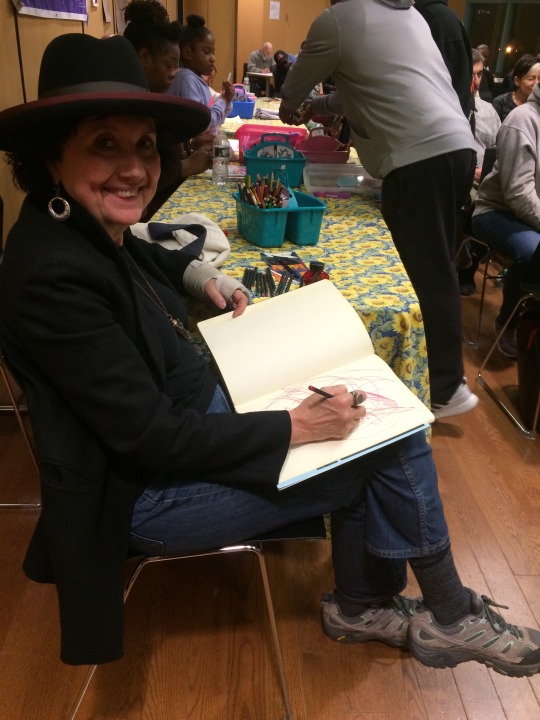
This interview took place on the Zoom platform on June 10, 2020 Ekua: I want to introduce Maddu Huacuja, who is a friend, an esteemed artist, a very passionate involved community member who works with sparc! as a lead artist for our Paint Nights - along with many other things that she does with sparc! She attends and participates in Paint Jazz, she's done community based murals for Paint Salsa, so she's a part of our family.
We thought we would start our series by interviewing her with maybe some questions that I had and maybe some questions that you also had.
So welcome Maddu.
Maddu: Thank you it’s a pleasure to see your face.
Ekua: My first question for you Maddu, was how do you begin a painting?
Maddu: *chuckles* First I take a nap, after my canvas is ready I go to sleep in the studio.
Doesn't matter what time it is, day or night. I just lie down. I guess it’s a meditation but I feel like I’m dreaming the painting first and then I just make a mark anywhere on the canvas, just to break the whiteness of it. I generally have a vague idea of what I am going to paint. I never have a finished sketch or anything like that, it’s a general idea. I know what's in my heart and what's on my mind and I start creating images and have a conversation with the canvas.
Ekua: I think that's very admirable, given the beauty of your work. Another thing that I think is very admirable is how large you are able to work sometimes. Can you tell me, why do you work large, what's important about working large to you?

Maddu: Even though I seem like a very calm person and I am, I need to be moving. So the large canvas - I can move from one end to the other. Sometimes I have to get on a ladder or a step stool, and then I really feel like an artist, but I like the movement. I feel that if I’m moving the image moves. I also always have music playing, often loud and active music. I have a lot of different music. I put it on a roll and the mood of the song or piece moves me in a certain way, so that becomes part of my imagery. I feel like the movement is really important. I don’t want to paint a painting that isn’t moving.
Ekua: So you're not sitting down, you're not standing in one spot, you're moving around that canvas. Do you work in oil or acrylic, what kind of mediums do you use?
Maddu: I often mix acrylic with drawing. I rarely work with oil. I think again because of the movement, acrylic is faster, but I do like oils. Everytime I think about it I'm like, “Oh I want to paint with oils”. But when I get to the studio it’s like I’m in acrylic. I like having a bucket of water near me, maybe that’s all it is.
Ekua: Well It certainly does dry faster, which allows you to move through a very large painting a little bit faster. Do you feel that your subject matter is in a particular area that you don’t really stray from? Is your storytelling about a particular kind of story or do you move around? How would you describe that aspect of your artwork?
Maddu: It’s not a decision, it's sort of how it works out. My focus is mostly… well, I do a lot of abstract but also I don’t know if I’m mostly figurative. When I do figurative work I am focused on people that “don’t matter”, either symbolically or specific people. For instance years ago there was a massacre in Mexico and all these men were murdered and the women were left as widows and the children were all orphaned. They were very poor to begin with. So they went to the local city hall to make a statement to try to get help, etcetera. There was a tiny photograph in the magazine of these women with their babies and every single one of them was barefoot, and I decided to paint their portraits. As I was painting I was like, “Why am I doing this, here in the United States no one even heard of this place, let alone cared about it?” I just thought, “Well If I don’t do it nobody is going to do it” and it seemed important to me. So I struggled through all those toes and little baby feet. It was in the show that you saw at the Roxbury Community College gallery many years later. So sometimes an event that touches me is my theme. I think I am very connected to my Mexican roots, so it's not just in the events that happen but in my image making. It really is part of my DNA; the colors, the kind of images I create. I think it is influenced a great deal from my childhood in a city that was thriving: vibrant with public art, murals everywhere, beautiful fresco murals, with the famous three muralists Diego Rivera, David Alfaro Siqueiros , José Clemente Orozco. And also by Frida Kahlo's work. My mother was a painter, so even though she wasn’t painting I knew she had been a painter and her oils were in the closet. So, you know, it just became part of who I am. I think that still comes through. Sometimes my focus is specifically on women.
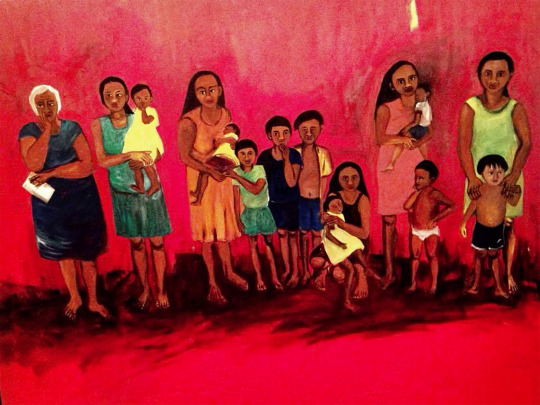
Ekua: So we mentioned RCC as the sight of one of your exhibitions. I know recently you’ve been spending some time over at Bunker Hill Community College and you had an opportunity to do some teaching. I am wondering how you feel teaching influences your artwork or has an impact on your artwork. Working with young artists, not just young artists but artists that you are mentoring within a classroom setting or within a community arts setting like sparc! the ArtMobile. How does that seep into your consciousness or into your work?
Maddu: I love teaching. I enjoy teaching spanish or art. I like all ages, so sparc! in particular is perfect for what I love because you have 2 year olds and 82 year olds and everything in between. I think teaching is fun, and as far as what I paint it’s freeing, it just loosens my hands, my mind. At Bunker Hill most of the teaching I did was around the exhibition that was up. It was called Open the Way and it was up from October through the end of February. So it was a long stretch and a lot of classes came in, and I learned a lot about my painting from my teaching these students.It was fascinating because, particularly in Bunker Hill, there's a really international student body. Every time there was a class there were at least 10 countries represented and several continents. It was very interesting because I said in one class that in a previous class people were not speaking up, and a student from the African continent, I don’t remember which country, it might have been Ghana, said “That’s because they are being polite. You don’t just speak in front of your elders.” I was like, “Oh.” I was humbled by that. Also, about my paintings, they saw things and told me things about how the work affected them and what they saw in it. That was wonderful for me to hear, really an eye opener for me.
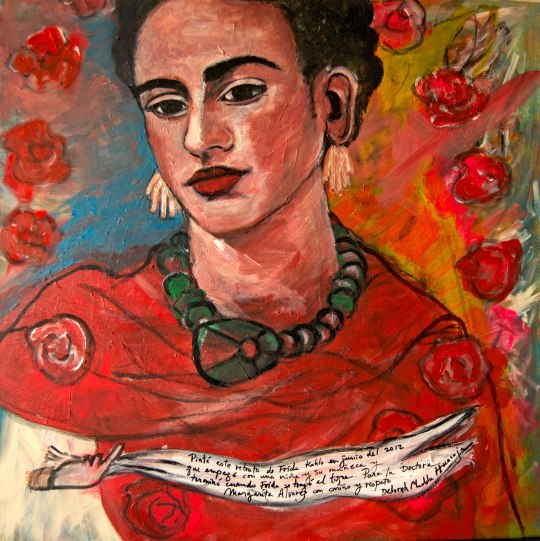
Ekua: That’s so interesting that you can learn about your art from a viewer.
Maddu: Yes, totally.
Ekua: Revelations about the richness of your own artwork.
Maddu: Yes, I wish that I could have recorded everything that was said. Of course nothing was recorded and I always regret that I didn’t take half an hour afterwards to write down the things that I heard. That’s something that I definitely want to make part of my practice.
Ekua: When you're teaching at an event like Paint Night, and you have this audience from 2 to 92 and everything in between, do you come in with one sort of thing that you want everyone to leave with? You know some people obviously have more skill with painting. Children are interested in mixing all the paints together and sticking their hand in it. Everybody’s entering from a different standpoint, but what do you as an artist hope to impart as a takeaway for each person?
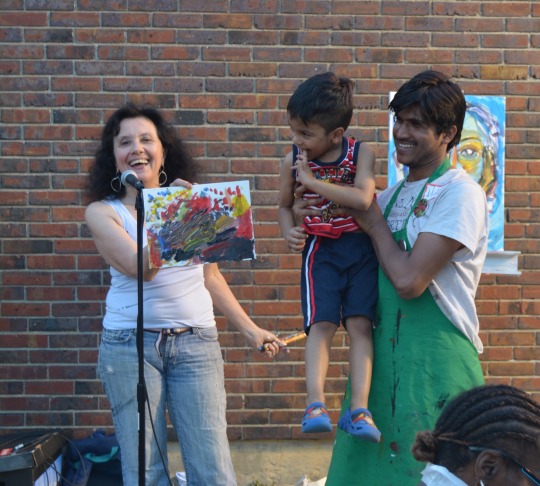
Maddu: You know, the didactic part of me wants them to learn one thing at least. Even if it’s just what blue and red make, or something. I really want them to learn how to use a brush. There's always something that is very gratifying for me that they learn. But mostly, I usually come after my day job to a Paint Night because they are always on a Monday night, and very often I am like, “God, how am I going to make it through this class?” I’m so tired and my mind is mush and I get there and I just get this energy from sparc!. From all the helpers that are amazing, and without it I wouldn't do it, and from the students because they come with their own positive energy. So I hope they leave the class like I leave the class, which is feeling really happy. You know it’s uplifting to me to do the class. I figure if they are happy they are going to like art because it is a happy experience, and so I like them to feel good about what they did, and about themselves. I like to bring each kid up and show his work or her work and introduce themselves, and say something about the painting, which I think is a good thing regardless of what you’re teaching or what they are learning. Just to be able to get up in front of a group of people that they mostly don’t know and introduce themselves and speak up. It leads me to my other piece of my art and being an artist is, in this time - where I feel we are on the brink of many things - I think it’s really important for people to speak up. If they learn to speak up, to say “Hello! I’m over here and I have this much to say!” and to be able to say it. I think if they learned that we have accomplished something
Ekua: I totally agree with that. You know, initially I thought people would be very shy about getting up and talking about their work, but the overall atmosphere of a Paint Night seems like an environment where people feel comfortable, safe and feel welcomed. Little kids or people who have never spoken before a crowd get up and talk about their painting. They receive so much warmth and appreciation. I think it's such a key part of the Paint Night experience and I believe that you are the artist who started doing that, and now it has become a part of our best practices. So thank you.
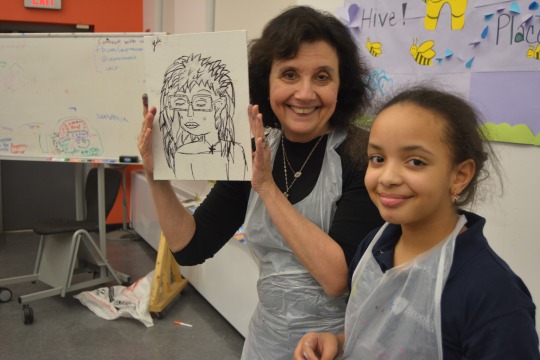
Maddu: I’m very happy to hear that. I remember one kid in particular - putting her on a chair because she was so tiny. ”You stand over here and show everybody.” It’s like 45-60 people in the room, and it's a wave of “Aww that’s beautiful, that's wonderful!” Clapping. “Congratulations!” And the kid just seems to overcome their shyness. So yeah, I love it.
Ekua: Well I am sure you know we miss being able to do our Paint Nights this semester and we are looking at an uncertain fall. We don’t know if we will be able to be together in that room with 50-60 people. We will have to create something new. If you were speaking to some of the folks at home, sheltering at home during this pandemic, how would you encourage them to bring more creativity into their life - even though they aren't at a Paint Night, or they might not even have paints or supplies. Is there anything you can share with them about your life as a creative maker that they can apply to their lives now?
Maddu: I think the only way anything gets done is if you make room for it, and that goes for everything. So we tend to give prime importance to our job. You have to be there by 9 o’clock no matter what happens there you are. But when it comes to our own personal stuff we tend to give it less importance, like going to your exercise class or going to your studio seems to be less important - but it really isn't. I think the only way, particularly when we are sitting around and no one’s telling us that we have to be anywhere, we have to initiate on our own. “Today at noon I’m going to drop everything and go to my studio.” Or “I’m going to pull out my little art stuff.” Whatever you have at home, put on some music or tapes whatever it is that inspires you and motivates you and just do something. It doesn’t matter how much you get done for an hour - or maybe that’s stretching it.
Ekua: I guess that can even be dancing or singing. I mean it’s not necessarily all visual art but just the idea that each of us has a creative spirit that is longing for expression.
Maddu: Right. Or sit down and write for an hour regardless of if it's your masterpiece or not - or your future novel. I signed up online for an app called Ulysses that is a writing app. I love it because it is very intuitive and you just write. You don’t have to save or anything, whatever you write is saved automatically. You don’t have to format. So it makes it easy. You have to find ways to know yourself enough to make it happen for you, make it easy.
Ekua: Well here is my last question. I was in another zoom meeting the other day and someone said we need to reframe all of our work as social justice work. I thought that was really interesting to think about everything I do in the context of social justice. So as not just an artist but an arts activist, how would you apply that to your life in this sort of immediate time? Being an activist and reframing as a social justice activist?
Maddu: Well the fact that this is a pandemic and we are all locked down - but here we are. We can still influence and speak up through all the media. We all need to be political. There is no option. It's not like, “Oh I’m not into politics.” Everybody has to be into politics. Making art, the decision to create is, in my mind, a political statement. The one thing I would say is, vote at every level, not just for the presidential elections but all your local elections. Find out who your local representatives are, call them up. You can do that, it's not hard. Write letters if that is what you are prone to do. Again it's a matter of everybody has to act and find what it is that you deeply care about and act on that even if it is about saving polar bears. You know if it's about politics or if it's about...
Ekua: Global warming, climate change.
Maddu: Everything is so dire, you know.
Ekua: Mhm feels that way.
Maddu: If you just hold it in you're going to die, so just do something, do anything. And do it with somebody else. Join a group and see what is going on. Meet on zoom and see what people are talking about. Together we rise. I think it’s always been a crucial moment, but this one is really obvious. People are dying everyday, thousands of new people are sick. This is really life and death, and if we allow the current president another 4 years I dont know whats going to happen.
Ekua: Heaven help us.
Maddu: I mean really seriously it’s not even like “Oh I like this candidate or that candidate”. Forget that. I think everything you do to influence the social fabric and what's going is literally saving the world. Saving the world for our children, for our grandchildren, for ourselves. And if we let this moment pass it’s going to be that much harder.
Ekua: And all of the tools at our disposal include painting, poetry and dance - things that touch the heart and soul.
Maddu: Absolutely.
Ekua: So everybody can do something.
Maddu: Everybody! Children can do something. They can write letters.They can study. They can read books and find out their history, find out what's happened before. I also don’t mean everybody has to go around in a panic and freaking out. I think we need beauty, we need to feed our heart and our soul and our mind with poetry and beautiful paintings, or intense paintings. But it’s not just about the intensity, but about the beauty and the love.
Ekua: Love is at the center of everything good, I would say.
Maddu: I think Rumi said “Love is the bridge between you and everything else”.
Ekua: Like that! Well, I want to thank you for taking this time out to be with us. I’m sure you and I could talk for another hour at least but I want to keep it within a framable amount of time that people can squeeze in or listen to while they are painting or whatever. We don’t know what will happen in the fall but whatever we're doing Maddu, we know that you're going to be a part of it, in terms of sparc! the ArtMobile and the Center for Art and Community Partnerships. We thank you so much for being a part of our family, contributing to the beauty in the world, and we will be back in touch with you very, very soon.
Maddu: Thank you for everything you do, especially for this community. And I am a total fan. I think you're a hero.
Ekua: Thank you so much.
2 notes
·
View notes